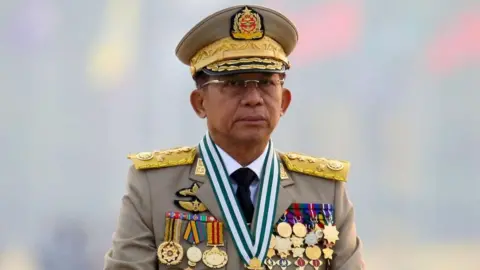Myanmar leader heads to Bangkok as quake deaths climb to 3,000
 Reuters
ReutersMyanmar's junta chief Min Aung Hlaing is in Thailand for a regional summit as his country reels from an earthquake that killed thousands and left cities in ruins.
The earthquake in central Myanmar last Friday killed 3,085 people and injured 4,715, the junta has said. Hundreds more are missing and the toll is expected to rise.
Min Aung Hlaing arrived in Bangkok on Thursday, according to AFP, on the eve of a summit that will gather leaders of the seven countries that border the Bay of Bengal.
His attendance, which was earlier confirmed by a spokesman for the Myanmar army, will be unusual as sanctioned leaders are typically barred from these events.
Host Thailand, where the earthquake was felt and killed 21 people, has proposed that the leaders issue a joint statement on the disaster. Bangladesh, Bhutan, India, Nepal, Sri Lanka are also part of the summit.
In Myanmar, many earthquake-hit areas have yet to be reached by authorities, meaning the death toll figures are unlikely to be accurate.
Countries around the world have sent aid and rescue teams to Myanmar since the quake, but poor infrastructure and an ongoing civil war has complicated relief efforts.
The junta announced a temporary ceasefire late on Wednesday to expedite these efforts, after earlier rejecting proposals from armed ethnic rebel groups.
Before this, the military had continued its airstrikes in rebel-held areas, including those badly hit by the earthquake.
On Tuesday night, troops opened fire at a Chinese Red Cross convoy carrying relief supplies. The junta said the troops fired after the convoy refused to stop despite being signalled to do so.
Min Aung Hlaing is also expected speak to Thai Prime Minister Paetongtarn Shinawatra on the sidelines of the meeting in Bangkok, according to a Thai foreign ministry spokesperson.
Myanmar has been gripped by a bloody civil war since the military seized power in 2021, which led to the rise of an armed resistance that has been fighting alongside armed ethnic groups, some of which have been fighting the military for decades.
Years of violence have crippled the economy, supercharged inflation, and plunged the country into a humanitarian crisis.
Now, the earthquake has worsened the crisis. Humanitarian groups have urged the junta to lift any remaining obstructions to aid.
The UN has also urged the global community to ramp up aid before the monsoon season hits in about a month.
